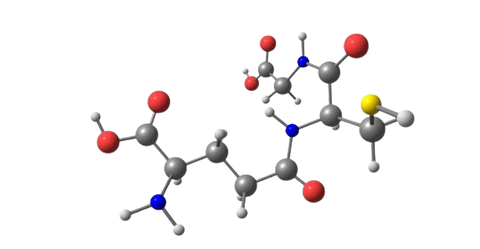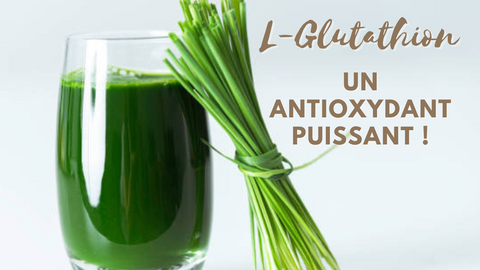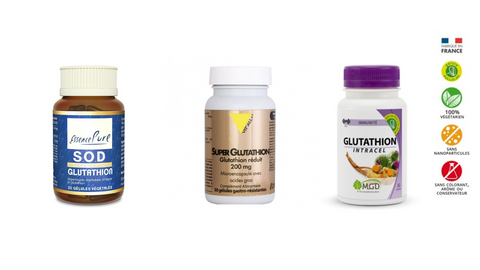Today we will take a closer look at what Glutathione is, in which cases to use it and how to choose the right supplement.
What is L-glutathione?
L-glutathione is a tripeptide naturally present in the body, composed of three amino acids: glutamic acid, cysteine and glycine.
Glutathione, which exists in oxidized and reduced form, is involved in maintaining the redox potential of the cell cytoplasm.
It is considered the "master antioxidant", more colloquially it is a super anti-rust.
it plays a crucial role in many life processes, including:
- Protection against free radicals: L-glutathione neutralizes free radicals, responsible for oxidative stress and cellular aging.
- Liver Work: It helps in removing toxins and heavy metals from the body.
- Strengthening the immune system: It stimulates immune cells and fights infections.
- Energy production: It is essential for the production of ATP, the main source of energy for cells.
L-glutathione: what is it for?
L-glutathione is a valuable ally for health and well-being.
Its potential benefits include:
- Improved cognitive functions: L-glutathione may protect against neurodegeneration and improve memory and concentration.
- Strengthening natural defenses: It helps fight infections and chronic illnesses.
- Detoxification of the body: It promotes the elimination of toxins and heavy metals.
- Fights against skin aging: It protects the skin from damage caused by free radicals and reduces the signs of aging.

The benefits of L-glutathione (and when to use it)!
L-glutathione may be beneficial in many situations, including:
- Oxidative Stress: If you're exposed to significant stress, pollution, or cigarette smoke, L-glutathione can help protect your cells from free radical damage.
- Chronic fatigue: L-glutathione may improve energy and vitality by promoting ATP production.
- Detoxification: L-glutathione is an excellent choice for supporting liver function and removing toxins from the body.

How to choose the right L-glutathione food supplement?
When choosing an L-glutathione dietary supplement, it is important to consider certain factors:
- The form of L-glutathione: L-glutathione is available in different forms, including the reduced form (GSH) and the oxidized form (GSSG). The reduced form is the most bioavailable and therefore the most effective.
- Dose: The optimal dose of L-glutathione depends on your individual needs. It is generally recommended to start with a dose of 500 mg per day and gradually increase it if necessary.
- Product quality: Make sure you choose a quality product from a reliable brand.
Adverse effects of L-glutathione.
L-glutathione is generally considered safe when taken in recommended doses.
To conclude, L-glutathione is a powerful and versatile antioxidant that provides numerous health benefits. If you are looking for a natural way to protect your body from free radical damage, improve your energy, and strengthen your natural defenses, L-glutathione may be a great choice for you.
sources:https://fr.wikipedia.org/wiki/Glutathione
- 1: Hong SY, Gil HW, Yang JO, Lee EY, Kim HK, Kim SH, Chung YH, Hwang SK, Lee ZW (2005). Pharmacokinetics of glutathione and its metabolites in normal subjects. J Korean Med Sci. 20(5):721-6.
- 2: Martin HL, Teismann P (2009). Glutathione--a review on its role and significance in Parkinson's disease. FASEB J. 23(10):3263-72.
- 3: clinical science 91:575-582, 1996
- 4: Nutrition reviews 54:1-30,1996
- 5: Kretschmar M, Klinger W (1990). The hepatic glutathione system-influences of xenobiotics. Exp Pathol. 38:145-164.
- 6: : Corcoran GB, Wong BK (1986). Role of glutathione in prevention of acetaminophen-induced hepatotoxicity by N-acetyl-l-cysteine in vivo. J Pharmacol Exp Ther 238:54-61.
- 7: Biaglow JE, Varnes ME, Epp ER, et al (1989). Role of glutathione and other thiols in cellular response to radiation and drugs. Drug Metab Rev. 20:1-12.
- 8: Ketterer B, Coles B, Meyer DJ (1983). The role of glutathione in detoxification. About Health Perspective. 49:59-60.
- 9: Clinical science 91:575-582, 1996
- 10: Abdalla DSP, Monteiro HP, Oliveira JAC, et al (1986). Activities of superoxide dismutase and glutathione peroxidase in schizophrenic and manic-depressive patients. Clin Chem. 32:805-807.
- 11: Marshall KA, Reist M, Jenner P, et al (1999). The neuronal toxicity of sulfite plus peroxynitrite is enhanced by glutathione depletion: implications for Parkinson's disease. Free Radic Biol Med. 27:515-20.
- 12: Jenner P, Olanow CW (1998). Understanding cell death in Parkinson's disease. Ann Neurol. 44(3 Suppl 1):S72-84.
- 13: Merad-Boudia M, Nicole A, Santiard-Baron D, et al. Mitochondrial impairment as an early event in the process of apoptosis induced by glutathione depletion in neuronal cells: relevance to Parkinson's disease. Biochem Pharmacol 1998;56:645-55.
- 14: Pearce RK, Owen A, Daniel S, et al. Alterations in the distribution of glutathione in the substantia nigra in Parkinson's disease. J Neural Transm 1997;104:661-77.
- 15: The lancet 344:796-798,1994
- 16: Samiec PS, Drews-Botsch C, Flagg EW, et al (1998). Glutathione in human plasma: decline in association with aging, age-related macular degeneration, and diabetes. Free Radic Biol Med. 24:699-704.
- 17: Adams JD Jr, Klaidman LK, Odunze IN, Shen HC, Miller CA (1991). Alzheimer's and Parkinson's Disease. Brain levels of glutathione, glutathione disulfide, and vitamin E. Mol Clin Neuropathol. 14:213-226.
- 18: Bains JS, Shaw CA (1997). Neurodegenerative disorders in humans: the role of glutathione in oxidative stress-mediated neuronal death. Brain Res Brain Res Rev. 25:335-58.
- 19: Chiang GC, Mao X, Kang G, Chang E, Pandya S, Vallabhajosula S, Isaacson R, Ravdin LD (2017). Alzheimer's Disease Neuroimaging Initiative, Shungu DC2. Relationships among Cortical Glutathione Levels, Brain Amyloidosis, and Memory in Healthy Older Adults Investigated In Vivo with 1H-MRS and Pittsburgh Compound-B PET. AJNR Am J Neuroradiol. 38(6):1130-1137.
- 20: Lands LC, Gray V, Smountas AA, Kramer VG, McKenna D (1999). Lymphocyte glutathione levels in children with cystic fibrosis. Chest. 116(1):201-5.
- 21: Clinical science 91:575-582, 1996





Comments (0)
There are no comments for this article. Be the first one to leave a message!